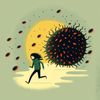When my mom died, I didn’t want condolences. I didn’t want cards. I didn’t want phone calls. I didn’t want to stand around listening to everyone else talk about how much they missed their moms.
I didn’t want to talk about it with anyone.
I wanted to be left alone.
And yet, people brought it up. They brought it up at the most inappropriate times, too, like right before I taught my classes.
Here’s the truth:
I didn’t know how to grieve like a neurotypical person with a neurotypical mom. I was a neurodivergent person with a paranoid schizophrenic mom. Grief looked very different for me.
The platitudes I got from neurotypical people didn’t help, but I had to pretend to accept them in order to avoid their judgment. Wondering how they would react, wondering if I was grieving in a socially acceptable way, that caused me stress. The real help came from books. It came from music. It came from sitting in dark rooms. It did not come from making myself vulnerable to people who wouldn’t try to understand when I said things like, “I’m kind of glad she’s dead. I don’t miss her.”
Recently, someone shared a video with me about friendship. The whole thing made me want to puke. It starts off by defining loneliness as “being without a close friend,” and then compares it to smoking 15 cigarettes a day. The stock images alone reinforce all kinds of stereotypes about solitude. It’s a constant stream of sad people sitting alone in empty rooms, followed by happy people in groups.
Some of us have never felt more alone than when we were surrounded by smiles and laughter. We’ve never felt more grounded and connected than when we were alone, even sad.
This video explained all the reasons why I might not have close friends. At one point, it suggested I spend too much time parenting — as if parents just love doing everything by themselves.
Finally, the narrator (a senior fellow at the Brookings Institute) tells us to make ourselves more vulnerable.
Sorry, what?







